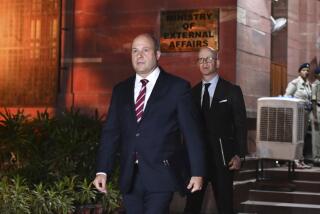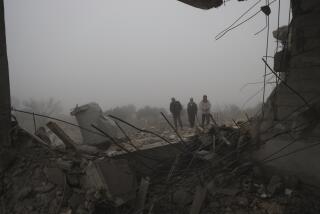U.S. Demands Expulsion of Iraqi From U.N.
UNITED NATIONS — The U.S. government accused a senior Iraqi diplomat at the United Nations of espionage Friday and demanded that he be sent back to his homeland.
Abdul Rahman I.K. Saad, who holds the title of first secretary at Iraq’s U.N. mission, was formally accused of “activities incompatible with his diplomatic status” in a State Department letter delivered to the mission Friday, U.S. officials said.
Though the officials declined to specify what Saad’s alleged activities were, diplomats who asked not to be named said he had been accused of attempting to recruit American citizens to provide Iraq with intelligence information about U.S. government activities.
Saad’s actions were “deemed to be harmful to the United States,” the State Department said in its letter.
“For all intents and purposes, this is an expulsion,” said a U.S. official here, who requested anonymity.
The Iraqi mission would offer no public comment on the U.S. accusations, a diplomat there said Friday. But in a written response to the State Department, the Iraqi government defended Saad’s conduct and asked the United States to substantiate its charges.
“The permanent mission of Iraq considers the conduct and activities of Abdul Rahman I.K. Saad to be within his official capacity,” the Iraqis wrote, according to U.S. diplomats who received a copy of the letter in their offices here.
Reminiscent of the Cold War era, the diplomatic move marks the first time that the United States has officially sought the removal of a U.N.-accredited diplomat since 1996, when Washington ordered a Sudanese envoy out of the country, U.N. officials said.
In the State Department letter, the U.S. government requested that Saad leave the country by the month’s end. Under U.N. rules, Iraq can appeal the demand to U.N. Secretary-General Kofi Annan, who supervises diplomatic accreditation here. But by precedent, Annan would be expected to let the U.S. request stand, U.N. officials said. And even if Annan were to rule in Iraq’s favor, the United States could still order Saad’s expulsion.
Saad, who was posted to the U.N. mission less than a year ago, is one of 16 Iraqi diplomats accredited here. The envoys to the world body are the only Iraqi diplomats residing in the United States. Washington broke off diplomatic relations with the Persian Gulf nation in 1990, after Iraq’s invasion of Kuwait.
As is the case with U.N. diplomats from Cuba, North Korea, Libya and Iran, the Iraqis are prohibited by the U.S. government from traveling more than 25 miles from New York and cannot engage in any professional activities unrelated to their U.N. assignments.
In Washington, a few Iraqi consular officials work in their government’s interests section in the Algerian Embassy. In 1994, the State Department ordered the expulsion of the head of the Iraqi interests section, accusing him of illegally lobbying Congress on Iraq’s behalf.
The diplomatic confrontation here coincided with an escalation of military tension between the United States and Iraq, as the Pentagon announced Friday that U.S. and British warplanes had attacked an Iraqi radar facility in Amarah, about 165 miles southeast of Baghdad.
The bombing raid was launched in retaliation for Iraqi antiaircraft fire against U.S. and British planes patrolling a “no-fly” zone imposed over southern Iraq, said U.S. military spokesmen at the Central Command in Tampa, Fla.
An Iraqi military spokesman said in a statement carried by the official Iraqi News Agency that the U.S. and British warplanes carried out 42 sorties Friday from bases in Kuwait. “The enemy attacked our civilian and service installations in Amarah,” the Iraqi spokesman said, according to a Reuters report from Baghdad.
Though the Bush administration advocates what it calls a “regime change” in Baghdad, Secretary of State Colin L. Powell said in Canada on Friday that there are no immediate U.S. plans to overthrow President Saddam Hussein by force.
The U.S. and other members of the U.N. Security Council recently imposed new trade sanctions on Iraq and reiterated demands that Hussein’s government open its doors to U.N. weapons inspectors.
Iraqi Foreign Minister Naji Sabri has held two rounds of talks here this year about the possible return of the inspectors, who left Iraq at the end of 1998. He is scheduled to meet again with Annan and other U.N. officials in Vienna on July 4 and 5. But U.S. and European diplomats at the world body say they expect the Vienna discussions to be similarly inconclusive, and they anticipate requests from the Iraqis for further negotiations.
“The only thing that will get the inspectors back is the threat of U.S. military action,” said one senior European diplomat here, who asked not to be named.
More to Read
Sign up for Essential California
The most important California stories and recommendations in your inbox every morning.
You may occasionally receive promotional content from the Los Angeles Times.










